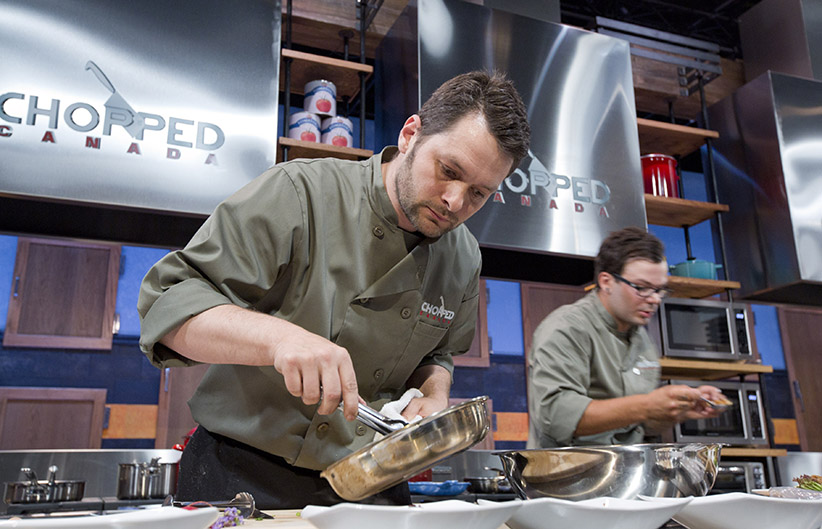CNA chef-instructor brings a competitive edge to the classroom
Chef Roger Andrews gets out of the kitchen and into competition, and brings back a whole lot of inspiration
Grade A: Culinary instructor Roger Andrews won $10,000 on an episode of Chopped Canada with his rib ragout in a root beer reduction
Share

For the most part, cooking school is a lot of straining stock, learning to how to hold your knife without stabbing anyone, and how to be on time every day. So when chef Roger Andrews demonstrated reverse spherification for his cooking students (ever had those bubbles in a fancy restaurant that seem to impossibly hold beet soup or a mojito in a ball?) it was more stagecraft than lesson plan.
“It was like magic to me,” says former student Jonny Collins, referring to the method for creating spheres of liquid encased in a thin membrane. “He taught us a lot of stuff you wouldn’t get unless you’re working at a high-end restaurant, cool stuff that I’d never get a chance to do anywhere else.”
Andrews, who trains cooking students while crushing competitions at the same time, is proving the old adage “those who can’t, teach” wrong.
At the Newfoundland College of the North Atlantic, Andrews instructs apprentice cooks during the eight-week, in-class blocks that fall between their three stretches of professional cooking experience. Over the course of those 1,800 working hours, students are expected to absorb the basics of kitchen safety and knife skills. In between, Andrews exposes them to advanced techniques—charcuterie, bread making, cooking wild-game meat, sushi preparation—that their rookie positions are unlikely to cover.
When he’s not teaching, 42-year-old Andrews is competing in events such as the Gold Medal Plates (Canada’s national chef competition, where he won gold in 2015), the international Culinary Olympics (he helped team Canada bring home gold in 2012) and the television show Chopped Canada, where a rib ragout, root beer cream reduction and waffle croutons, plus butter-poached lobster with maple-fudge succotash, helped him win $10,000 in 2015.
READ: College of the North Atlantic | Stephenville, N.L. | Founded 1997
It also achieved his ambition: “to prove that a culinary instructor can throw down like a restaurant chef.”
Studying food administration at CNA in 1994 (when it was known as Cabot College), Andrews cooked at restaurants and hotels in the Grand Caymans, Bermuda and P.E.I. before returning to his alma mater in 2006, this time as an instructor.
“When teachers get into that role, they kind of stay in the same mindset,” says Andrews. “Competing is a way to stay current and fresh with the industry. It’s a way for me to keep my skills fresh as well.”
With a reputation that extends far beyond his school, Andrews is the answer to the cooking student who asks what they can learn from a teacher who couldn’t make it in the industry.
“He’s one of only four supremely talented chefs in St. John’s,” says Karl Wells, restaurant critic for The Telegram in St. John’s. “Everything employed in a Roger Andrews dish is there for good reason, for balance, appearance and taste,”
Wells describes Andrews as a chef born with an exceptional palate, unafraid to take chances (like infusing a squab reduction with the essence of a fragrant shrub called Labrador tea) and is always working to master new techniques and ingredients.
“Roger is very competitive,” adds the critic. “But to be honest, I think his main competition is himself. He can get a little sullen when he loses a contest but that’s mainly because he’s upset with himself.”
The chef admits that his personal drive to win is why he prefers to compete solo, rather than with a team.
“I beat myself up pretty hard if things don’t turn out well. That’s why I like doing these individual competitions, where it’s you and you alone. If you mess up, you mess up. In a team, then the whole team suffers.”
He’s not entirely alone. Students at the college help him practise. And, combatting the trope of the instructor whose own learning has ossified, the new skills and technologies he explores in competition are knowledge brought back into the classroom to share.
“He’s an intimidating cat, so accomplished,” says Collins, who now works as a cook at Memorial University in St. John’s.
Andrews taught Collins during his final lesson block, before Collins wrote his Red Seal apprenticeship certification exam in 2012. He says that the chef, who introduced the class to next-level cooking techniques, was unlike any other teacher he’s ever had.
“He’s not yelling or overpowering. But he makes you push yourself. The best part about him is you’re allowed to experiment. Even if it fails, you learn something from it.”
[widgets_on_pages id=”Education”]